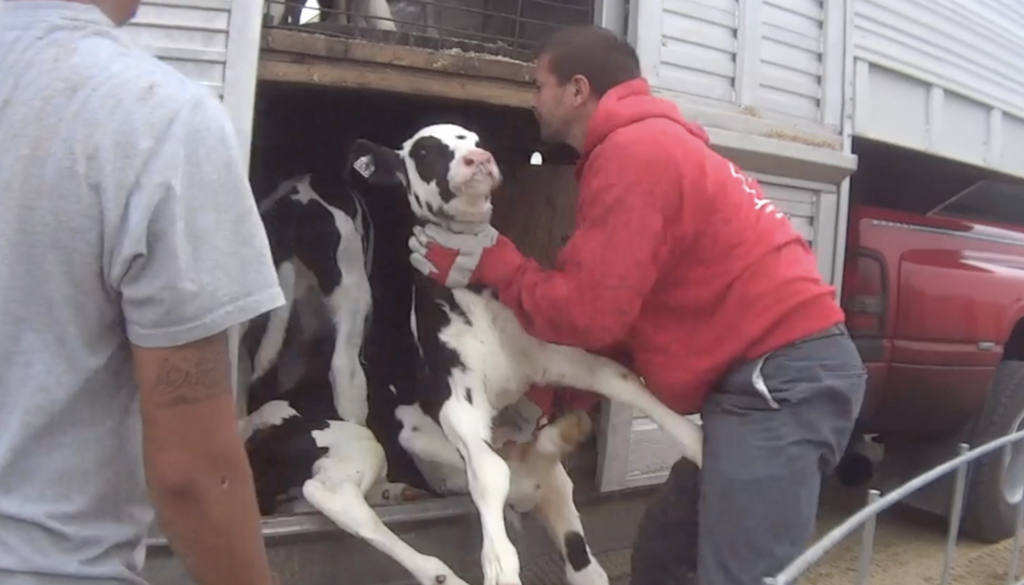Did you know that HSHV is a vegetarian organization? We don’t ever use donor money or sponsor events that entail meat (for human consumption, that is; feeding animals is a bit trickier) and are careful to avoid or to consider the sourcing of other animal-based food and products.
We do this because not eating animals is another way we can help save lives. We do it also because of the rampant and pervasive cruelty in the industrialized farming industry, known as factory farming.
It isn’t our job to tell folks what to eat, but it is our responsibility to increase awareness around systemic abuse. Just like we talk about puppy mills and laboratories testing on beagles, we need to talk about the nearly 10 billion animals in the US food industry who suffer needlessly.
People sometimes get confused or offended when we talk about issues that go beyond their own personal comfort zone. But whether it’s deer, wolves, cats or calves, it’s our job—our mission since 1896—to educate and promote respect and compassion for all animal life. Because companion animals get the bulk of public attention, many don’t realize wild and farm animals are also a part of our everyday rescue work.
 Recently, videos were released by the Animal Recovery Mission (ARM) from an undercover investigation done at Fairlife’s Fair Oak Farms, near Chicago. Fair Oak is one of the largest dairy farms in the country, supplying a major grocery chain and the Coca-Cola company. They claim animal welfare is their top priority.
Recently, videos were released by the Animal Recovery Mission (ARM) from an undercover investigation done at Fairlife’s Fair Oak Farms, near Chicago. Fair Oak is one of the largest dairy farms in the country, supplying a major grocery chain and the Coca-Cola company. They claim animal welfare is their top priority.
Yet video taken over months shows routine, wanton cruelty. Bleating calves, separated from their mothers right after birth are kicked, stomped, hit, dragged and thrown by workers. In one clip, a worker angrily hits a calf in the mouth with a plastic milk bottle, frustrated with her natural rejection of the artificial replacement of her mother, but required to keep her alive for whatever commercial use is planned for her. An additional video shows mother cows subjected to systematic violence as they’re crammed into milking machinery, some with afterbirth still present.
Labeled “Agra-tourism,” the farm is called “the Disneyland of farms,” hosting a half million visitors annually. They say they provide a “fun-filled look at the life of a cow” and advertise giving families “the chance to learn more about where their food comes from.” Indeed. Probably not the message they wanted us to learn, but one we needed to.
It’s worth noting this farm’s owner is a veterinarian, touting strong dedication to humane practices. Can you imagine what happens on other factory farms where they don’t even pretend to care and everything is hidden from public view?
When it comes to how we interact with the world, how we spend our money and what we eat, we usually have choices. It’s impossible to be perfect. But we can make positive change by seeking to do less harm and more good.
In the words of Sir Paul McCartney, “If Slaughterhouses had glass walls, everyone would be a vegetarian.” (Here are several restaurants in Ann Arbor that are reportedly so good, they could persuade one to give up meat/dairy!) And even if you aren’t ready to go full veggie, informed choices can make a difference. Switching where you can to plant-based options helps, as does seeking more ethical sources, like “pasture raised,” to avoid the brutality currently routine in industrial farming operations.
But no matter your personal choices, we all need to keep pressure on our politicians, policy-makers and corporations to create a more humane world. Transparency, strict animal welfare standards and external oversight is needed in all animal industries to protect them from large-scale cruelty.
The farming industry is crying out for reform. If we stay aware, if we keep fighting for what we know is right with courage and compassion, we can change anything.
P.S. Awareness is essential to change. As upsetting as they may be, I’d encourage adults to try to watch these videos and share with others.



